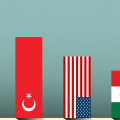The United States is known for its low taxes on goods and services compared to other OECD countries. 18% of their income comes from this source, compared to an average of 32%. This can largely be attributed to the fact that it does not have a VAT at the national level. To answer the question of whether taxes in the US are high or low compared to other countries, it is important to consider taxes as a part of the economy.
According to a graph from the Center for Tax Policy, the US is at the bottom of the list, 25 percent below average. When it comes to taxing corporate profits, the US has one of the highest nominal maximum rates in the world, at 35%. However, deductions and other tax strategies mean that relatively few US companies actually pay this rate. In fact, according to estimates by the Chicago Fed, US companies pay an effective rate of 15%, which is higher than the comparable rate of 20% paid by German companies.
The authors of a new study looked in particular at how the US tax regime compares to that of Germany, a nation they chose because its economy resembles that of the US. It turns out that US companies pay higher income taxes than German companies. The nominal corporate tax rate could be a problem for the US economy, as it encourages US corporations to move their operations overseas to keep tax bills low. However, those who represent federal corporate income tax represent a relatively small portion of the US overall fiscal picture, according to the Chicago Fed study, representing less than 10% of total tax revenues.
How do these rates compare to those in other countries? According to a research article published by the Federal Reserve Bank of Chicago, the US has relatively low taxes. In fact, of the 35 OECD countries, the US ranks 32nd in total tax burden, a measure that includes income, property and several other taxes. The low tax burden in the US is driven by low personal income taxes, says the Chicago Fed. The Republican Party's new tax law reduced it to 21 percent.
With relatively low taxes, Americans have to navigate one of the world's most complex filing systems. The Tax Foundation's tax data report shows that 1% of people with the highest income (1,410,710 people) pay 40.42% of all income taxes in the United States. Japan may be even more confiscatory, with tax rates that range from 5% on low income amounts to 50% for higher amounts. An analysis of data on the distribution of taxes in the United States reveals that people with high incomes pay a vastly disproportionate amount of total income taxes in the country. Taxes exceeded 40 percent of GDP in seven European countries, including France, where taxes accounted for 46 percent of GDP. Clearly, progressive tax structures in most wealthy nations are disproportionately dependent on tax revenues from those who earn the most.
Kennedy lowered the declared rate to 70%, but eliminated most of the loopholes, effectively raising taxes on the richest. Value added tax (VAT), a type of general consumption tax collected in stages, is the main source of consumption tax revenue within OECD countries. Without a real analysis of tax laws in the United States or any proportion of money earned by wealthy people in this country after taxes compared to middle or low-income families, it seems that wealthy people in this country are paying through their noses while everyone else pays much less. That's wrong; you forget that tax rates are progressive and therefore you would earn much less than that.











Leave a Comment